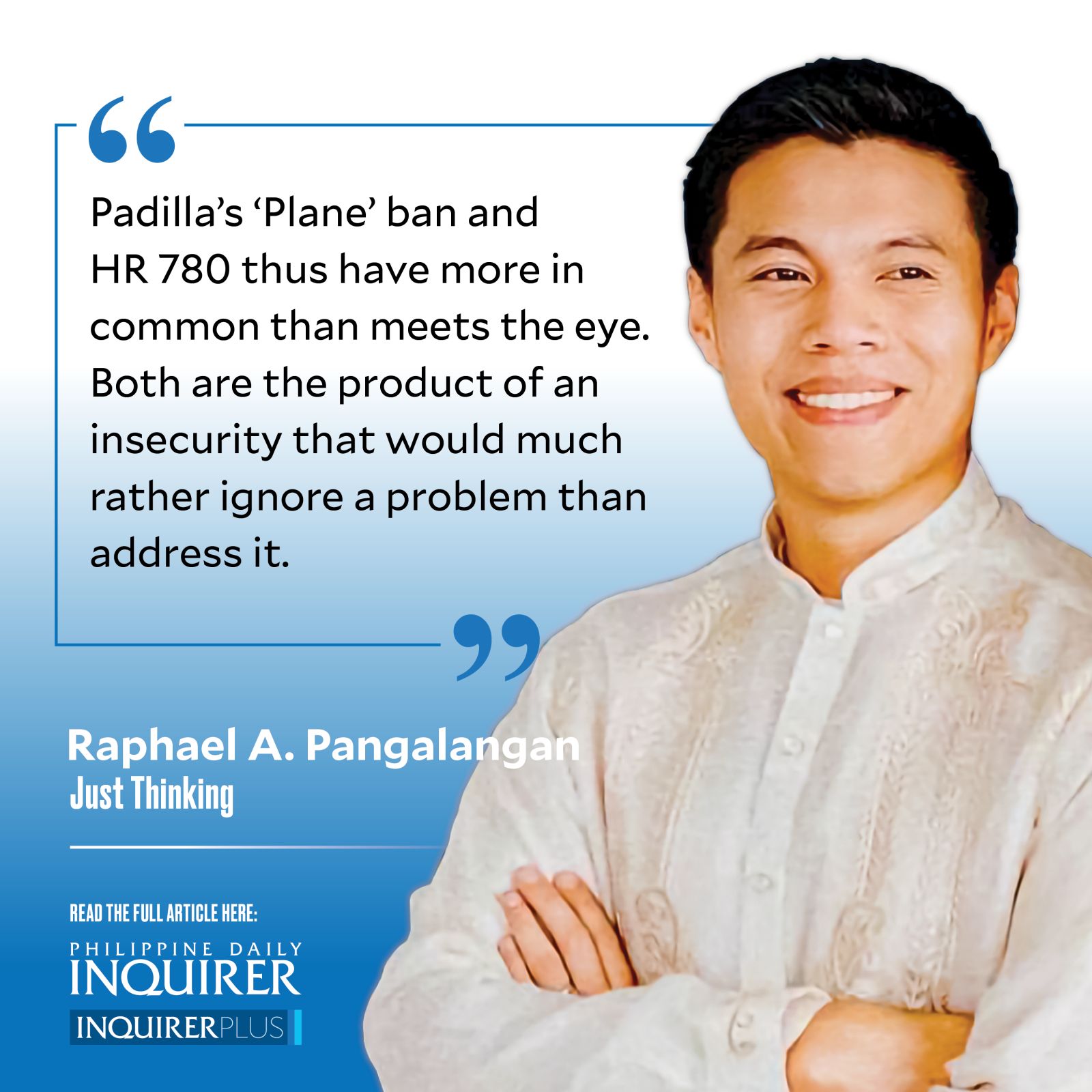Stranger than fiction
Who would have thought that a film starring two-time Razzie nominee Gerard Butler could lie at the center of political controversy?
First-term Sen. Robinhood C. Padilla is calling for the ban of “Plane”—a B-movie production on a group’s fight to survive against terrorist elements on the island of Jolo, Sulu. (Note: The movie, though set in the Philippines, was actually shot in Puerto Rico—coincidentally, a country-cousin of sorts. Both Puerto Rico and the Philippines were bargaining chips to conclude the Spanish-American War and were ceded by Spain to the United States through the Treaty of Paris of 1898.)
Senator Padilla claims that the film casts the country in the dimmest of light, which says a lot coming from the former actor who himself starred in movies in/famous for its gratuitous sex and violence. “Carnap King: The Randy Padilla Story,” “Walang Awa Kung Pumatay (Killing With No Mercy),” and “Badboy II” come to mind, the titles of which alone spell a common intemperate theme. And while we’re at it, how could we forget “Anak, Pagsubok Lamang ng Diyos,” which was shot inside the New Bilibid Prison where the convict-now-senator Padilla was serving a 17-year jail term for illegal possession of firearms. Certainly, if “Plane” should go for giving us a bad rap, these movies too should fly off with it.
But perhaps what is most perplexing about Padilla’s call is not the hypocrisies in IMDb, but the dissonance beyond it. In 2022, the Philippines ranked 16th lowest in the Global Terrorism Index, while travel to the Sulu Archipelago remains code red by the US government. A US travel advisory reads: “Level 4: Do not travel. Terrorist and armed groups continue to conduct kidnappings on land and at sea for ransom, bombings, and other attacks[.]” I ask: Why bother censoring Hollywood when the view at home is just as bleak?
It’s something I came to realize closely about half a decade ago. I began teaching ethics at the University of the Philippines—first with the Department of Philosophy in 2017, and now with the UP College of Law and College of Medicine (PGH). At the start of each semester, I pose to my class the trolley problem—a series of scenarios involving a runaway trolley and a choice: Should the train engineer (i) stay on course to eventually collide and kill five people or (ii) turn the wheel onto a sidetrack but collide and kill a lone individual?
The question prompts us to choose between group welfare, on one hand, and individual right, on the other. But as my students would soon later realize, what began as a thought experiment of abstract relevance easily crescendos into a harsh realization of no small importance.
Trolleyology is not mere theory. In many ways, it is reality. Fact is not only stranger than fiction. It is sadder too.
Gone are the days when Mill and Kant faced off only in pages. Today, we need not even open our books; we simply need to pick up a newspaper or look out our windows. But rather than see these issues through, Padilla would much prefer the world to turn a blind eye.
Padilla exposes one of our country’s more latent quirks: butthurt. We may enjoy the comedic styles a la Jokoy, sure, but we will also be quickly up in arms when “Grey’s Anatomy” discredits Filipino doctors. We don’t mind being the butt of the joke, so long as we ourselves are the ones cracking it.
But Padilla is not alone. Last week, 19 members of Congress—led by former president and now House Senior Deputy Speaker Gloria Macapagal Arroyo (GMA)—introduced House Resolution No. 780 declaring their “unequivocal defense of former president Rodrigo Duterte” from the International Criminal Court (ICC) probe. Notably, the congressfolk do not even deny that Duterte committed crimes against humanity. Rather, they simply justify it. They echo the same old arguments on the necessity for and success of the drug war, but in the process lay bare—perhaps unwittingly—their raw insecurity. Recital No. 6 describes the ICC case as “totally unacceptable” and reads: “They are insulting us[.]”
There is much to be said about HR 780. First of all, the GMA-led contingent comes as little surprise. Lest we forget that it was GMA herself who, during her term as president, refused to transmit the Rome Statute to the Senate for ratification (see Pimentel v. Executive Secretary, 2005). Second, there is also a glaring separation of powers issue herein involved when the legislative branch jumps to the defense of the (former) chief executive.
And finally: Duterte should not be impressed, as it is quite the weak show. After all, HR 780 is but that—a resolution—in contrast to a bill that may eventually become binding law. If GMA and her motley crew were serious about defending Duterte, then they could have commenced the legislative process on a sanction similar to Trump’s June 2020 directive against ICC officials. HR 780 thus reeks of the same political posturing too common in patronage politics—nothing more and nothing less.
Padilla’s “Plane” ban and HR 780 thus have more in common than meets the eye. Both are the product of an insecurity that would much rather ignore a problem than address it.
——————
thinkjustly@gmail.com





















